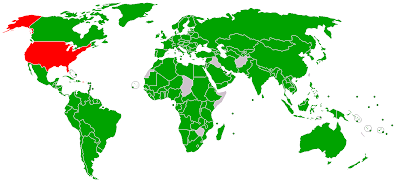
In case you haven't heard by now, a week ago the world's leading institutions of climate research, the University of East Anglia's Climatic Research Unit (CRU) in the UK, was infiltrated by computer hackers.
Soon information from the hacked emails leaked its way onto the internet (first on The Air Vent, a blog devoted to climate skepticism) and ignited the blogosphere. Since then climate skeptics have had a field day, using certain information from the hacked correspondence between premier climate scientists as proof that climate change is an international conspiracy. This incident may have finally unleashed the tension that has been building for months as the UN Climate Change Conference approaches (it begins a week from today, on December 7th in Copenhagen, Denmark).
Opponents to climate legislation have pointed to a few key phrases and to support their claims of climate conspiracy. Juliet Eilperin identified contentious content in this Washington Post article:
In one e-mail from 1999, the center's [CRU] director, Phil Jones, alludes to one of [Michael E.] Mann's articles in the journal Nature and writes, "I've just completed Mike's Nature trick of adding in the real temps to each series for the last 20 years (i.e., from 1981 onwards) and from 1961 for Keith's to hide the decline."The words "trick" and "hide the decline" are particularly troublesome. But Andrew Revkin of the New York Times reports further:
Dr. Mann, a professor at Pennsylvania State University, confirmed in an interview that the e-mail message was real. He said the choice of words by his colleague was poor but noted that scientists often used the word “trick” to refer to a good way to solve a problem, “and not something secret.”
The folks over at RealClimate, a blog produced by climate scientists and perhaps one of the most interesting and professional climate blogs out there, also responded to the CRU hack (excerpts below, but I highly recommend you read the full post):
More interesting is what is not contained in the emails. There is no evidence of any worldwide conspiracy, no mention of George Soros nefariously funding climate research, no grand plan to ‘get rid of the MWP’, no admission that global warming is a hoax, no evidence of the falsifying of data, and no ‘marching orders’ from our socialist/communist/vegetarian overlords. The truly paranoid will put this down to the hackers also being in on the plot though.
Instead, there is a peek into how scientists actually interact and the conflicts show that the community is a far cry from the monolith that is sometimes imagined. People working constructively to improve joint publications; scientists who are friendly and agree on many of the big picture issues, disagreeing at times about details and engaging in ‘robust’ discussions; Scientists expressing frustration at the misrepresentation of their work in politicized arenas and complaining when media reports get it wrong; Scientists resenting the time they have to take out of their research to deal with over-hyped nonsense. None of this should be shocking.
Despite these explanations, it is easy to see why these comments have sparked controversy, especially for those who have been hunting for cracks in the climate edifice for years...

At a time when Climate Skeptic in Chief, Senator James Inhofe (R - OK), dubbed 2009 "The Year of the Skeptic" because of Congress's inability to pass comprehensive climate legislation and the subsequent decline in the expectation for what can be realistically achieved in Copenhagen next week (This is a separate issue entirely, profiled here), the CRU hack comes as another blow to the climate movement. Watch Inhofe's personal message to Senator Barbara Boxer (D - CA) below (Inhofe is the senior Republican on the Environment and Public Works Committee, and Boxer the senior Democrat):
Inhofe has since called for an investigation into what he calls a manipulation of climate research, saying, "The stakes in this controversy are significant, as it appears that the basis of federal programs, pending E.P.A. rulemakings, and cap-and-trade legislation was contrived and fabricated."
Finally, in this eloquent and provocative article, Mark Lynas of The Guardian explains why this incident represents a "dangerous shift in climate denial strategy" and his colleague George Marshall describes how public trust in scientists as unbiased and objective communicators has been tarnished.
Oh, and just how heated has the discussion gotten? Watch actor-environmentalist Ed Begley Jr. spar with Fox News host Stuart Varney:

